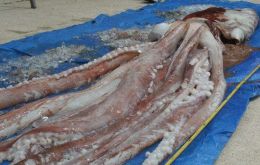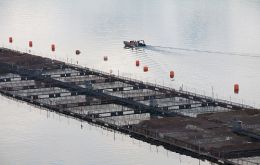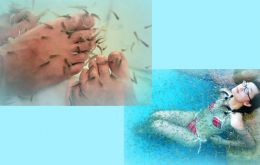MercoPress. South Atlantic News Agency
Fisheries
-
Friday, July 1st 2011 - 13:00 UTC
Fishermen recover giant dead squid off Florida coast

A trio of fishermen in the US state of Florida said they made an unusual find about 12 miles off the coast of Jensen Beach -- a dead giant squid measuring 23- to 25 feet.
-
Monday, June 27th 2011 - 16:17 UTC
Falklands, South Georgia success in minimizing long-line fishing seabird bycatch

A study has revealed that at least 160,000 and potentially in excess of 320,000 seabirds are killed annually in longline fisheries globally. Some previous studies have assessed the level of seabird by catching longline fisheries for particular regions and groups of seabirds, but this is the first study to provide a global estimate of by-catch of all seabirds in longline fisheries.
-
Saturday, June 18th 2011 - 01:36 UTC
Falklands’ fish, “a highly branded commodity” in Europe

Falklands’ fish is a “highly traded commodity” and customers are excited about secure and direct access to it, stated Director Fortuna Fishing Company Ltd Stuart Wallace this week.
-
Wednesday, June 15th 2011 - 14:41 UTC
Aquaculture more efficient than livestock production, says WorldFish Centre

WorldFish Centre and Conservation International (CI) have revealed a comprehensive analysis exploring the environmental impact of the world's major aquaculture production systems and species and gives an unprecedented global assessment of trends and impacts. The results from the two-year study show that aquaculture is more efficient than other forms of animal protein production such as livestock.
-
Wednesday, June 15th 2011 - 02:43 UTC
“Self determination and self sufficiency”, Falklands message to the world on Liberation Day

“Self-determination and self-sufficiency” is the Falkland Islands message to the world on the day the Islands commemorate the 29th anniversary of its liberation, said the Falklands’ government representative in London Sukey Cameron, who added Argentina continues with its campaign to claim sovereignty and disrupt the Falklands economy.
-
Monday, June 13th 2011 - 23:37 UTC
Millions of farm-salmon in south Chile moved because of the volcanic eruption

Chile’s National Fisheries Service (Sernapesca) authorized the transfer of more than five million salmon from three farms in the south of the country. The decision was taken as a precautionary measure because of the eruption of the Puyehue-Cordón Caulle volcanic range and possible pollution of rivers and lakes.
-
Monday, June 13th 2011 - 12:37 UTC
Argentina in 2011 is exporting more fish than beef

Argentina’s cattle herd and beef production continues to contract and the latest statistics give full support to the tendency that begun in 2006: in the first four months of the year fisheries exports were more significant that beef overseas sales.
-
Saturday, June 11th 2011 - 11:04 UTC
Chile’s volcanic eruption devastates regions fishing; threatens cattle and tourism

A week’s ago volcanic eruptions in Chile’s South have crippled the fresh-water fishing industry there and potentially threaten the cattle industry, too.
-
Friday, June 3rd 2011 - 07:53 UTC
Korean group plans shipyard in south Brazil to cater “Malvinas” fishing fleet

The Korean fishing group Insung signed this week an letter of intent with a Brazilian consortium for the construction of a ship yard in the Rio Grande/Pelotas area , state of Rio Grande do Sul, which could cater to the Korean fishing vessels operating in the “Falklands/Malvinas” area.
-
Monday, May 30th 2011 - 00:41 UTC
“Fish pedicure” in the UK fuels health and animal welfare concerns

One of the fastest-growing beauty treatments in Britain, fish pedicures – during which tiny toothless carp smooth down feet by eating dead skin – has come under new scrutiny from health experts and animal rights campaigners, reports the Sunday UK media.
